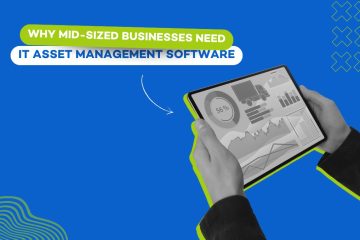Ever wondered how easy would it be if you had a technology which lets you manage your assets efficiently. An Asset Management software can help you bring this wish into reality. With the rapid growth of technology in the business world, it has become essential for any business to have an Asset tracking software to manage their asset. You can keep a track on your organization assets such as machines, equipment and even digital resources with only one click. After reading all these things about the software lets dive into a detailed explanation about what is an asset management software, its importance and benefits.
What is Asset Management Software?
As from the name Asset Management Software you can guess what it does. Yes, it manages your assets. This tool is specifically designed for business to monitor their asset throughout their lifecycle. This software covers everything from its purchase to maintenance and its disposal. It offers various features such as asset tracking, maintenance scheduling, depreciation calculation, and reporting. You could even have a customizable software for yourself, making it a versatile tool for business. Therefore, it provides a digitalized solution for the businesses out there who are struggling to manage their asset.
Importance of Asset Management Software
Now let’s talk about of the importance of Asset management software. Give below are some importance of asset management software:
1. Enhanced Organization and Efficiency:
Asset management software makes it possible for the businesses to run in a systematic way. This in turn minimizes the loss of assets that are being displaced or misplaced. Employees can find and use the assets they require by centralizing systems and thus they’d be able to do their work more quickly.
2. Cost Savings:
With asset management software you can save yourself some money. The software provides timely updates for the maintenance of the assets, cutting down maintenance expenses. It also provides information on whether you should buy an asset or not, preventing unnecessary purchases.
3. Compliance and Risk Management:
Asset management software allows businesses to comply with strict regulatory requirements. Thus, it makes sure to maintain accurate records by providing necessary documents about the assets. Additionally, it helps in risk management by making certain that all assets are properly maintained at all times and there is no defect in asset which may affect the working of the business.
4. Improved Decision Making:
The software provides an extensive list of reports and analytics, including the asset’s performance and its usage. You can use this data to answer questions like – What is the asset-wise ROI and how can the future investments be better planned. This will help you to make decision much faster, thereby improving your decision-making capability.
5. Better Maintenance Management:
Asset management software lets you make schedule and track your asset maintenance. This will ensure timely maintenance of assets which as a result would increase the lifespan of the asset. With your assets perfectly performing you can smoothly run your business operations without any difficulty.
Benefits of Asset Management Software
1. Streamlined Asset Tracking:
It has become pretty easier to have efficient asset tracking with asset management software. With it you can track your asset, see in what state and condition is it right now. This feature really comes in handy especially for business who have multiple working places and teams.
2. Accurate Asset Auditing:
Manually conducting asset audits may become a very time-consuming process and may also lead to having errors. For this you can conduct automated assets audit through an asset management software which provides precise information about the assets owned by the business. Therefore, simplifying the auditing process.
3. Enhanced Security:
Asset management software lets you know about the employees having access to your assets and its usage. This prevents the chances of the asset from being stolen or being misused. The software also provides various security features which even lets you control the working of the asset. This improves the overall security of the asset.
4. Scalability:
It is a common sense that if a business tends to grow, ultimately its asset also increases which means that now your software has more asset which needs be monitored. With its ability to scale and adapt to the uncertain needs of the business, asset management software can handle the increasing number assets with ease.
5. Integration with Other Systems:
A professionally built Asset Tracking software can also provide a seamless experience when syncing it with other systems. This allows you to integrate with other business-related software or systems such as accounting software and procurement system, thereby improving your business functioning between different departments.
6. Improved Customer Satisfaction:
Asset management software helps businesses that offer services or rent equipment to customers, to keep their assets in the best possible condition. This will lead to improved service delivery and higher levels of customer satisfaction. Satisfied clients are more prone to come back and may recommend your business to others.
Conclusion
To sum it up, asset management software is a strong force that can lead to transformation in business asset management. The gains are huge, ranging from increased organization and efficiency, cost cutting and even improved security. Strong asset management software ensures that assets are utilized for their intended purpose, well-maintained and contribute to overall business success. After knowing about asset management software, its feature and benefits if you are convinced and decided of getting an asset management software for your business, you can reach out to DI Infotech, which as a great software development company in Delhi. With its team of professional software developers, you can create your very own Asset Management software which will be suitable for fulfilling your business requirements.



0 Comments